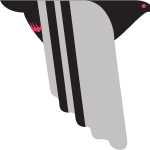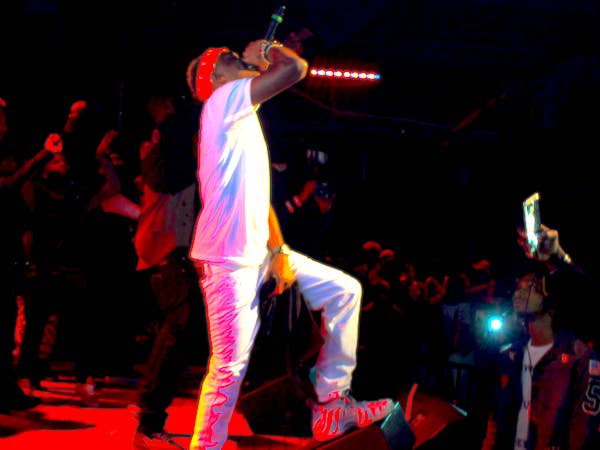1.
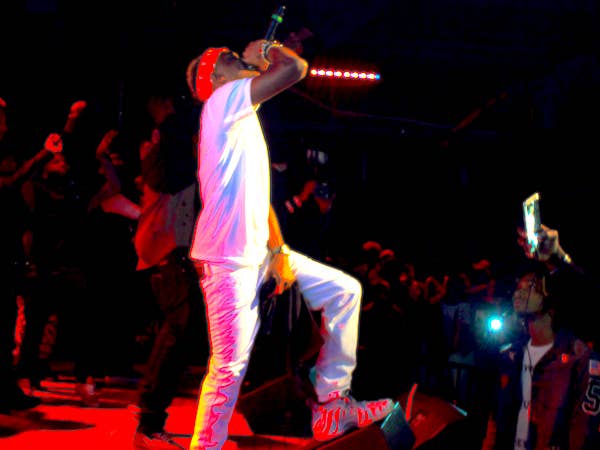
Image via Dizz Gavins
By Al Shipley
“Where the cigars at? It’s a celebration!” Tate Kobang, wiry and short with an orange bandana tied around his head, is backstage at the downtown venue Baltimore Soundstage, shouting and joking with friends before a big headlining show.
The friend he happens to be shouting at is Kevin Liles, the legendary Baltimore-born label executive who’s been in the music industry so long that he co-wrote Milli Vanilli’s “Girl You Know It’s True.” A few hours earlier, Kobang was on the air with his mentor on local radio station 92Q, and a few days before that, he’d released his most high profile mixtape to date, Since We’re Here.
Tate Kobang—born Joshua Goods—has been releasing mixtapes since 2011, but the ride he’s on right now effectively started a year ago. Last April he self-released Live Hazey, which was quickly overshadowed by “Bank Rolls,” a 90-second track he released concurrently as an afterthought—a quick YouTube video to promote the album.
The track’s beat is from the 2000 single “Bank Roll” by Baltimore rapper Tim Trees. It was instantly familiar to anyone in Kobang’s local fanbase.
But the Tim Trees song, though it’s echoed out of clubs and cars throughout Baltimore on a daily basis for 15 years, had never penetrated national consciousness. Within months, the Tate Kobang version did just that, earning him millions of spins online and a contract with 300 Entertainment.
After “Bank Rolls” took off with local DJs, Kobang went into the studio with the producer of the original Tim Trees track, Baltimore club hitmaker Rod Lee, and extended the freestyle into a full-fledged song with a hook. The first half of “Bank Rolls (Remix)” has an irresistible singsong flow, but the second half that Kobang added once he knew that it was a gamechanger has denser, more meaningful lyrics. If you listen to the track with that in mind, you can almost hear him rise to the occasion, second by second, turning a fun freebie into great song.
Like anything Tate Kobang does, though, “Bank Rolls (Remix)” has an irreverent sense of humor that makes it an appropriate Baltimore anthem—if not a squeaky clean tourism jingle. The line, “If you fuck a Morgan bitch you better strap up” has, unsurprisingly, not gone over well at Baltimore’s largest historically black college.
“I got banned from Morgan!” Tate says. “We just gonna post up outside Morgan one day and just perform. Fuck they gonna do?” His grandmother, who he’ll introduce onstage later in the evening as ‘Nana Kobang,’ sits next to him on a couch backstage, unfazed by her grandson’s uncensored style.
Onstage, Tate Kobang embodies that balance between mischievous fun, and the sharp-minded ambition of a skilled MC who’s studied albums by The Lost Boyz and Method Man that were released before he enrolled in kindergarten.
He dances as much as he raps onstage, opening his set with the 2015 track “Eat Da Pussy”—the hook “I go dumb dumb in that pussy” is something like a porn parody of Baltimore rapper Young Moose’s hit “Dumb Dumb.”
After a couple more lighthearted songs, Kobang makes a purposeful announcement about doing some songs with “substance” after getting the “trap” material out of the way. The next song, “Same Shit” from Since We’re Here, has a boom bap beat and knottier rhymes about more serious topics, but it’s not dull or earnest—just a perfect fusion of the varying impulses that Tate Kobang reconciles in his music.
4.
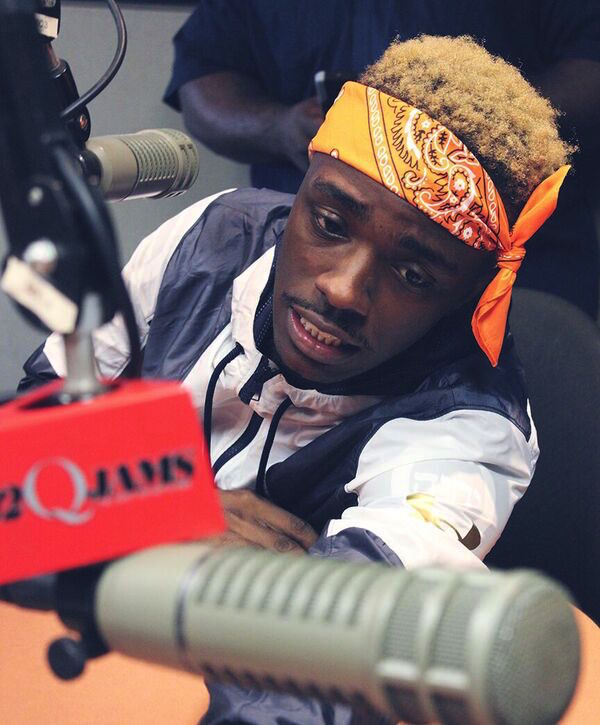
Image via Dizz Gavins
Songs like “Everyday,” the introspective closer of Since We’re Here, help flesh out Tate Kobang’s national profile, which thus far has been based on little besides “Bank Rolls.”
Out of his five frequently impressive previous mixtapes, only one of them—2014’s Crown Of Thorns—has been easy to find online over the past year. He fell out with the label that released his early music, and they vindictively pulled those tapes offline. Kobang pulled 2015’s Live Hazey off iTunes and streaming services just a month after it was released, when he started attracting attention from labels.
Despite being founded by major label vets like Liles and Lyor Cohen, 300 Entertainment is something of an experimental semi-indie. They’re distributed by Atlantic Records, but relatively hands-off with artist development. Their success stories are artists like Fetty Wap and Young Thug, rappers who latched onto unique sounds as regional mixtape rappers and then got the resources to push that sound to national audiences. That path is a bit different than the usual assembly line of industry-approved guests and producers.
Baltimore club music, a grimy offshoot of house music that’s ruled local dancefloors since the ’80s, was the foundation of “Bank Rolls.” Tate Kobang intends to keep representing the hometown sound, spending time in the studio with some of the producers who created the genre.
Dukeyman has been the engineer for most of the local sessions for his forthcoming debut album, and Kobang has several collaborations in the can with club innovator Blaqstarr—although “Nasty Girls” is their only collaboration on Since We’re Here. “Me and Blaqstarr got some shit,” Kobang says. “But the thing is, the world’s not ready for Blaqstarr, so you can’t give them too much.”
7.
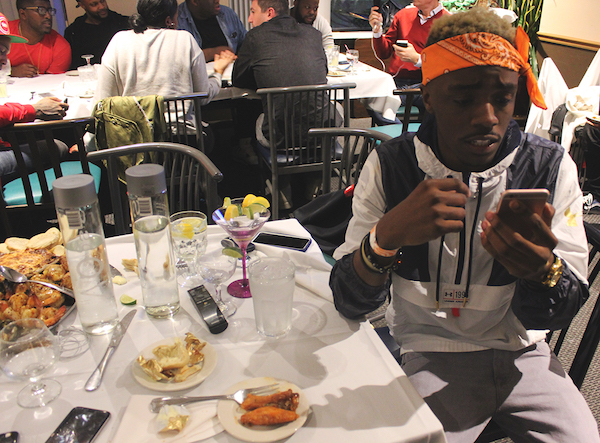
Image via Dizz Gavins
But as Tate Kobang spends more time outside Baltimore, he’s broadening his horizons with new collaborators. Atlanta-based producer The Honorable C.N.O.T.E. (Gucci Mane, A$AP Rocky) provided him with the perfect follow-up to “Bank Rolls” in the leftfield banger “Oh My,” which has caught on quickly since its release in February.
Nitti Beatz and Chuck Inglish also contribute beats to Since We’re Here. And, most significantly, Swizz Beatz has signed on to executive produce Tate Kobang’s debut album, bringing two decades of experience in off-kilter club bangers to the project.
“I lock in with Swizz, we might fuck around and do a whole jazz album on some crazy shit,” he says, more amped about the creative possibilities than the celebrity co-sign. “It’s all about the experience and being in the mood.”
9.
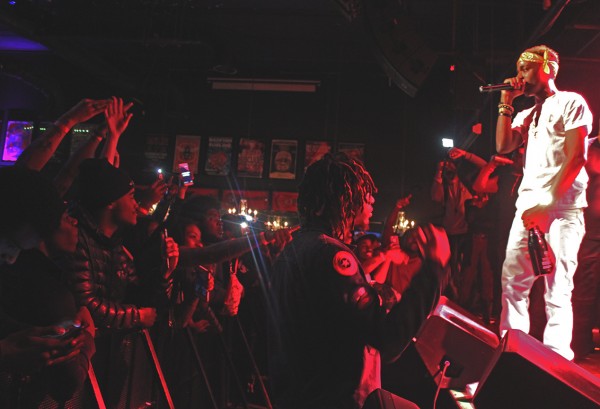
Image via Dizz Gavins
Tate Kobang hustled his music relentlessly before he got signed, and has kept up that pace over the past year. He’s performed hundreds of times, and sold thousands of Live Hazey CDs at shows even after pulling the album off iTunes. But the 300 machine is also working for him—“Oh My” has been featured in the PlayStation game MLB: The Show 16 and he’s been getting promotional placements on YouTube and Spotify.
In January, 300 sent Kobang and a few of the label’s other rising acts like Rich The Kid and T-Wayne on the road for the Young Hustle Tour. The tour was due to stop in Baltimore, but the Soundstage date was canceled thanks to a blizzard, so Kobang’s April show is a bit of a makeup gig, this time with other talented, dues-paying Baltimore rappers Damond Blue and Rickie Jacobs opening.
Tate Kobang had been in touch with Tim Trees over the past year, but vague plans to perform together, to celebrate the way their careers are now tied together by a beat, hadn’t yet come to fruition. As the only person who’s interviewed both of them, I took it upon myself to pester both rappers the week of the Soundstage show to finally make that happen, and I’m happy to say it worked.
11.
Halfway through Kobang’s set, he welcomed Trees onstage, effectively silencing any grumbling that he “stole” his hit, or doesn’t have the approval of the track’s originator. Since “Bank Rolls” was being saved for the finale, instead they performed “We Don’t Love ‘Em (Wayne Jones),” another beloved local classic from Trees’ string of early 2000’s radio staples. Kobang operated as hypeman, chiming in every other line.
Had fate taken a few different turns, Tim Trees and Rod Lee might have done for the Baltimore sound what Juvenile and Mannie Fresh did for the New Orleans sound. Perhaps the “Bank Roll” beat was too skeletal and laid back to fit in with the glossy major label rap of the early 2000s, but it sounds strangely current now, after Baltimore club music has threaded its way into popular music in a dozen small ways.
12.
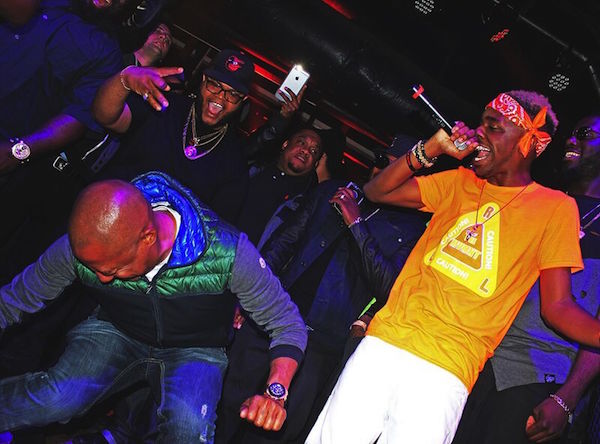
Image via Dizz Gavins
Many of the rappers who’ve competed for years to be Baltimore hip hop’s breakthrough star were in the house at Soundstage, happily egging on Tate Kobang. Freebandz Test, now signed to Future’s label, joined him onstage for their Since We’re Here collaboration “I Don’t Need.” Local street rap institution Skarr Akbar embraced the headliner backstage like a proud father. And Kevin Liles, who never had any luck signing rappers from his hometown during his tenures Def Jam or Warner Music Group, was onstage all night, drunkenly celebrating like any other fan.
Even Hammerjacks, the shuttered club Kobang nostalgically references on “Bank Rolls,” is scheduled to reopen in a new location in 2017. In Baltimore, a city that now more than ever exists in the national imagination as a symbol of urban decay and racial inequality, everyone’s happy to have someone to root for.
16.
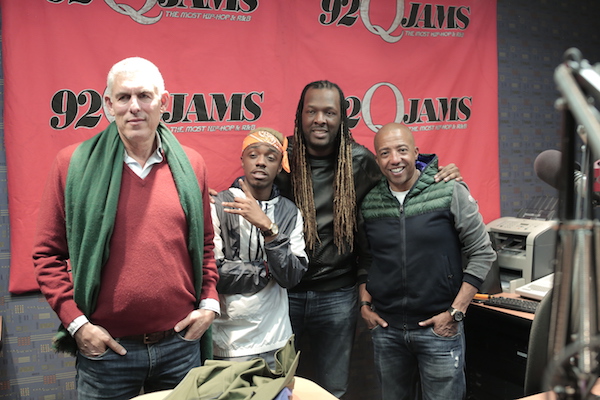
Image via Dizz Gavins
